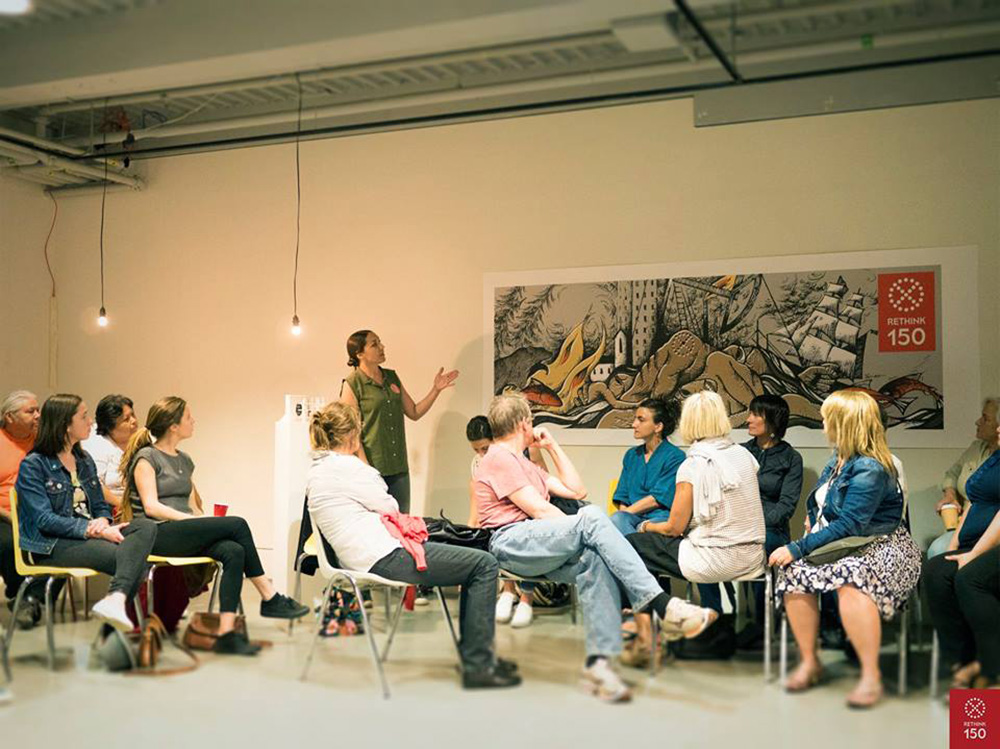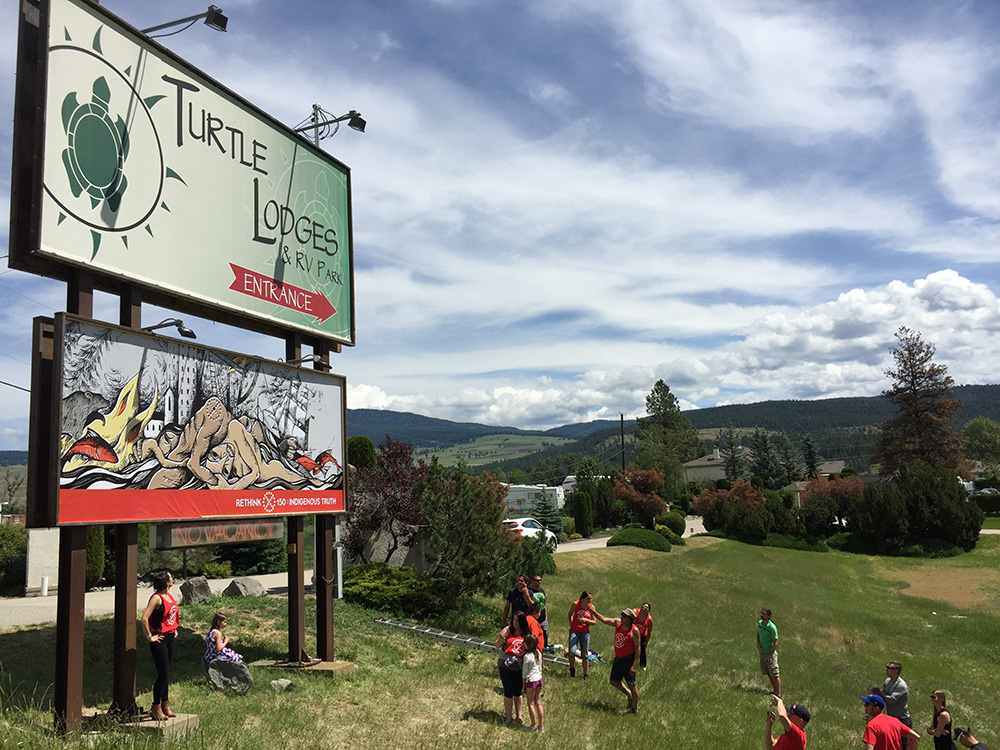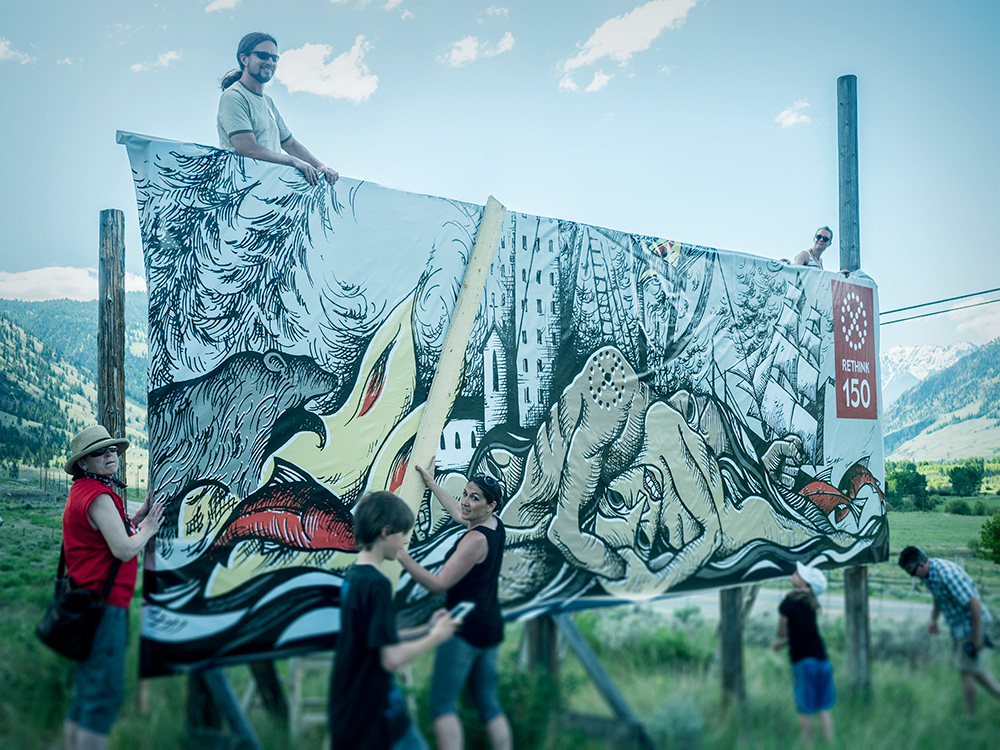The first billboard went up on Indian Reserve #2, the Lower Similkameen Indian Band, on a Saturday in May. A team worked on ladders to install the image while others assisted below. Children placed screws in washers, and community members gathered to participate. Set on hillsides of sage and prickly pear cactus, the dramatic billboard image now confronts people driving west on Highway 3 out of Cawston, British Columbia: a tall ship approaching the shore; industry, the Church, and western settlement structures encroaching on the land; the trees, bears and salmon pushed to the outer limits; and the Syilx people forming the land with their bodies, the water with their hair. In the upper right-hand corner is a bold red stamp of a stylized medicine wheel and the words “Rethink 150.”
This billboard is part of our Okanagan-based, Indigenous-led collaborative project called Rethink 150: Indigenous Truth. Our goal is to insert the local history of colonization, cultural genocide, land theft and environmental destruction in the valley into local Canada 150 events. We are dismayed that the celebratory narrative of Canada’s 150th birthday marginalizes Indigenous perspectives, and we see our project as connected to nationwide efforts to unsettle or decolonize Canada 150.
Our project began, as many do, with conversations at a kitchen table. For many Syilx people in unceded Okanagan territory, Canada 150 is not a celebration of national unity. It is a reminder of a short but painfully violent period within a much, much longer history of living in reciprocity with the land.
Conversations spread from kitchen tables to boardroom tables to accommodate growing involvement from both Indigenous and settler-identified residents in the valley. Two central questions emerged. How do we get settler-identified people in the Okanagan to understand Indigenous truths about past and present colonial relations? And how do we keep these stories alive, after the sugar rush of Canada 150 has subsided?
Since January, we have been volunteering time, skills, resources and community connections to build this project. We knew that the stories that needed to be told would be challenging to hear. Indigenous members of our project say that they are asked why they can’t just get over it and move on. Yet from residential schools to the Sixties Scoop, from land pre-emption to violence against Indigenous men, women and children, from natural resource extraction to land rents in cities, most of settler society still has so much to learn about the traumatic truths of colonization. We do not want to soften these truths, but we also want to open space for listening, learning and long-term change in the valley.
We began by gathering together — some telling stories and some listening — as Syilx community members described what they wished non-Indigenous Canadians knew about the colonial pain that Canada 150 represents. After seven meetings, settler-identified project member and visual artist Crystal Przybille translated the stories into a drawn image for the billboard, which was then offered back to the group for discussion and approval.

The night before the billboard installation, more than 60 people — Indigenous and non-Indigenous, from throughout the Okanagan territory — participated in a community discussion event held at the Alternator Centre for Contemporary Art in downtown Kelowna. Under a large-scale print of the billboard image, we listened to Syilx project member Dixon Terbasket put his challenge to the community: You’ve turned your backs on us for 150 years. Don’t turn your backs on us any longer. Learn about the real history of this place. Learn to walk with us.
The first billboard is the culmination of hours of consultation and planning. While prepared for negative backlash, we find it drawing public support from community members in the Similkameen and beyond. It has opened cross-cultural conversations and new friendships within the project team, and these are spilling into new conversations and connections within and between communities. Crucially, it is drawing more and more people into a process of listening and learning.
This is just the beginning of our public interventions and events. A second billboard went up on June 17 on Highway 97 just north of Kelowna, on IR #7 (Okanagan Indian Band), and we hope others will follow. As the most publicly visible element of our project, our billboard installations are a strategic intervention aimed at materially inserting Syilx understandings of colonization back onto the land that was taken. They grab the attention of residents and visitors and challenge them to rethink Canada 150.

Our events during the week of June 26 to July 3 offer people concrete ways to talk about these difficult truths and take responsibility for alternative futures. We have initiated a cross-cultural community art exhibition engaging the theme of Rethink 150: Indigenous Truth, open throughout the week at the Alternator Centre for Contemporary Art. We have organized a community discussion event on cultural appropriation on June 26; a site-specific artistic intervention and community discussion deconstructing public signage as colonial “place-claiming,” on Knox Mountain on June 28; a screening on June 29 of ‘untitled part 4: terra incognita,’ a film by Jayce Salloum that critically engaged Kelowna’s centennial celebrations in 2005 through the voices of Syilx people; and an activist poetry and spoken word evening on June 30. We will host a full day of public activities at the Alternator Centre for Contemporary Art on July 1, including speakers, community drawing events, and Indigenous dancers and drummers.
After the party ends, the hard work begins. We started without all knowing each other and without a clear vision of what we could do. We started by sitting down together, listening to hard stories, and imagining that life could be different, better, in the Okanagan. We have seen surprising energy build from just starting, together.

That energy needs to grow. The stories we have been brave to share and challenged to hear need to stay alive. The alternative futures need to be made real, in our relationships with each other and with the land that we live on together.
So we offer a challenge and an invitation for the days and years ahead: Don’t turn your backs on us. Learn about the past and present of colonial relations in your place. Learn to walk with us, and we can create what we can’t yet see. ![]()
Read more: Rights + Justice















Tyee Commenting Guidelines
Comments that violate guidelines risk being deleted, and violations may result in a temporary or permanent user ban. Maintain the spirit of good conversation to stay in the discussion.
*Please note The Tyee is not a forum for spreading misinformation about COVID-19, denying its existence or minimizing its risk to public health.
Do:
Do not: